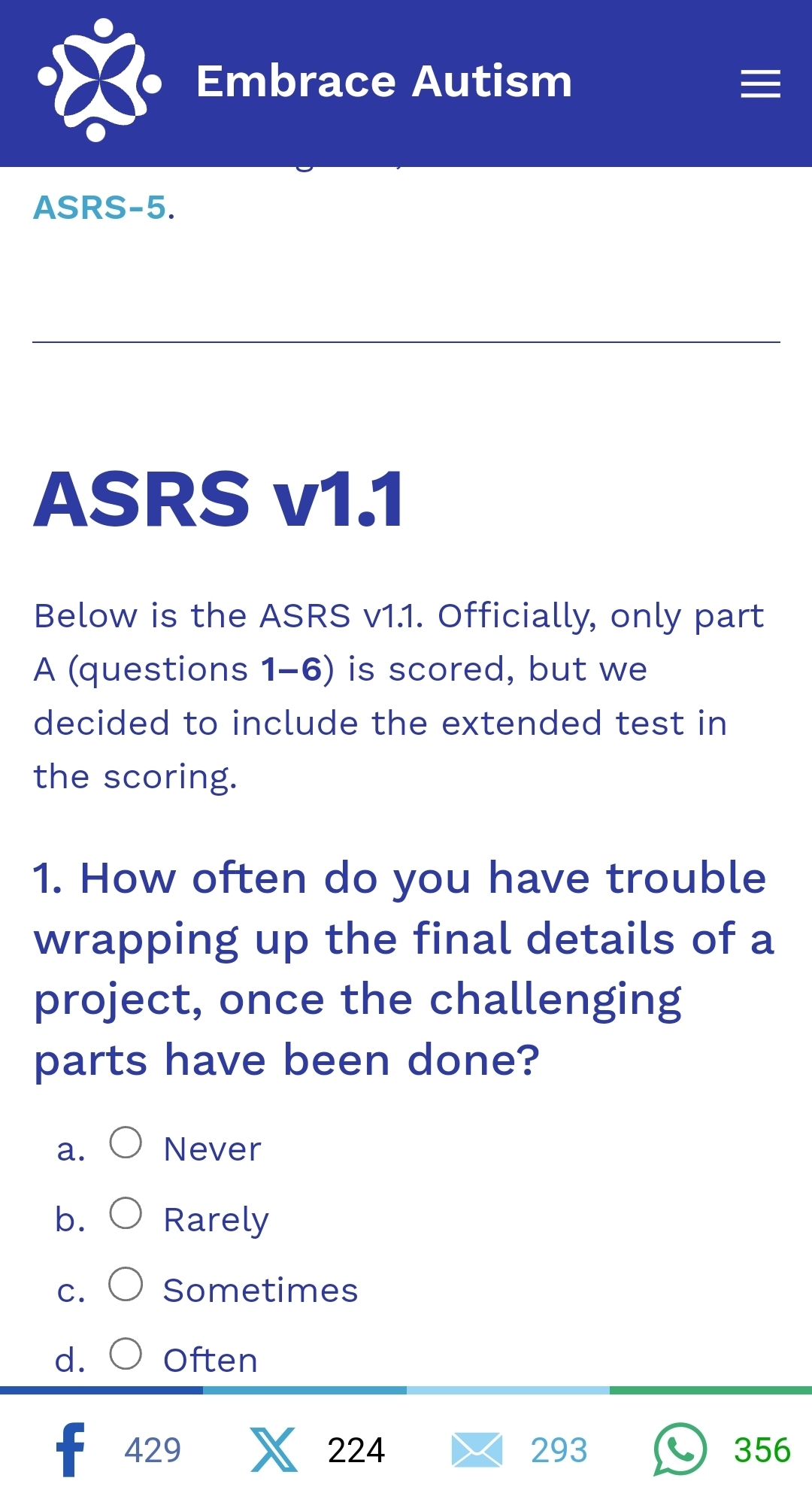Preparing for an ADHD assessment is a big task. Here's some things that I'd recommend sorting out to get the best outcomes:
-
Complete ADHD screening test(s), make special note of things that you struggle with or that you have strategies to compensate for. This one is a fine place to start with screening tests, scroll down to get to the questionnaire itself.
-
Any prior diagnoses, even ones that have been later ruled out and provisional diagnoses.
-
A general history of the psychiatric medications that you have taken and how you have responded to each.
-
School reports or a summary of how you performed in school, especially if it comes from family members - general trends, key themes that appeared repeatedly especially regarding "needs to apply themselves more", "is often distracted/distracts others", "is held back by being disorganised", "performs well in class but rarely completes homework", "struggles with time-management", "always leaves things to the last minute", "engages well when interested in the topic but refuses to engage with anything they find boring or tedious", along with anything to do with behavioural and emotional problems.
-
Any learning difficulties or developmental delays, any unusual childhood assessments that you underwent even if you don't know what it was measuring or the outcome of it, being put in any remedial classes or alternative education streams.
-
Informal statements or reports from the people close to you - friends, partners, family, even managers if you're on good terms with them. Make special note of if certain people have been nagging you about the possibility of being ADHD or a diagnosed ADHDer basically outright telling you "Bro, you got the ADHD - you realise this don't you?". Doesn't need to be a written letter of introduction, but just a collection of impressions from the people around you based on what they have observed. You might consider polling them and asking if they think you might have ADHD and relaying their responses to the doctor.
-
Anything that therapists have remarked upon to you that is contributing evidence for possible ADHD.
-
(Optional, depends on your relationship with the doctor in question) Your experience with consuming street drugs that are stimulants. This includes MDMA. If possible, pay particular attention to your ability to focus, your level of motivation, and your internal experience of being distracted etc. This can be a little bit dicey because you don't want to come off as drug-seeking but if you have an open-minded doctor or one that knows you well then you're probably alright to level with them about this.
-
Similar caveat to the above, make note of any difficulties with addiction or impulse control (binge eating, problematic impulse shopping, gambling, gaming, alcohol and other drugs etc.) even if it's sub-clinical, so for example you might not be a diagnosable sex addict but you know that you compulsively seek sexual gratification in a way that interferes with your relationships or your employment and in a way that is notably outside of what is typical for others.
-
How you function without caffeine.
-
Your coping strategies, such has having a bag you always carry with you which contains everything you could possibly need - food, an umbrella, spare medication, etc. because otherwise you will be unprepared and you'll forget everything. Or it might be having strategic caches of meds at your parents' house, your partner's house, your work desk etc. because you always forget to take your meds and to bring them with you. Or it might be a complete dependence upon an electronic calendar and alarms to tell you what you're supposed to be doing and when but without this your life would immediately collapse. That sort of thing.
-
Spending time thinking about what you were like as a child, especially compared to your peers. This works best if you can talk it through with someone who knew you as a child such as a close school friend or especially a caregiver. Try to piece together if there were any things that you particularly struggled with or where you were behind compared to your peers.
-
Developing a holistic understanding of the particular symptoms that make you suspect ADHD and how they present. If you have been diagnosed with major depressive disorder, for example, it can resemble ADHD in a lot of ways but if you can clearly remember struggling with focus and motivation as a persistent theme in your life prior to being depressed, this is crucial info. Or if you struggle with anxiety, do you find that even at home when you are calm and settled that your ability to focus or remember where you put things is still impaired, indicating that your ability to focus cannot be attributed exclusively to the anxiety?
-
Write everything down, collate hard copy evidence if you can (an ADHD screening test, medical reports, school reports etc.), and make sure that you take all of this info, including personal experiences and anecdotes, that you've brought together to the doctor so that you don't miss anything. If possible, make something like a bullet point list with prompts for all the critical bits of information you want to present to the doctor so you don't overlook anything and to help keep you on track.
Some words of advice:
-
You don't need to get all of this together in order to be prepared for an ADHD assessment. Don't feel like you have to achieve every one of these things above, this is just the example of what someone would have prepared in a perfect world situation. Do your best, don't let the list become a barrier to seeking a diagnosis because it's really just advice and guidelines. Seek support from someone close to you to help you with this if it feels a bit overwhelming.
-
Tell your doctor that you asked a peer worker who is diagnosed with ADHD for their advice on how to prepare for an ADHD diagnosis, which is why you are so organised.
-
Give the doctor your honest assessment of how difficult it was to get this together and what your experience would be if you didn't have this structure and advice while pursuing an ADHD diagnosis.
-
Be prepared for them to want to eliminate other potential causes of ADHD-like symptoms, especially depression and anxiety and bipolar, before they are willing to progress to considering ADHD.
-
Know that there are non-stimulant meds that can treat ADHD symptoms so if you come away from your appointment disappointed that instead of an ADHD diagnosis you have a prescription for some antidepressant like venlafaxine or bupropion, keep in mind that your doctor might be using this as a diagnostic probe to get a clearer picture of your symptoms and how you respond to meds. It's best to play ball, unless the doctor really shows a complete lack of interest in even considering ADHD, because they might be approaching an ADHD diagnosis with due caution and skepticism.
-
ADHD suffers from a lack of understanding, even amongst psychiatrists, especially in adults with late-diagnosis and if you're AFAB or a person of colour then your experience of ADHD is much more likely to fall outside the stereotyped understanding of ADHD, so you may find yourself pushing shit uphill. That's just how it is and it sucks but be prepared to seek a second opinion or to ask for a referral to specialist doctors or clinics for a more comprehensive ADHD assessment by people who know what they're dealing with when it comes to ADHD.
Take the test on my phone :
ShowResult looks like that, and I can’t switch to landscape mode.
Idk I think I’m autistic
That's odd, it renders fine on my mobile browser:
Show
Maybe try using a different browser or switching to displaying the desktop version of the site, that might fix it.
Failing that, this is just the ASRS (Adult ADHD Self-Report Scale) and it's widely available online from lots of websites. I like the embrace autism one because it provides useful information and criticism of the ASRS so I tend to link to that site in particular but it's going to be the same questions wherever you look.
I downloaded the pdf and it gave me a number and didn’t tell me if the number was high or not just a weird contact email.
Hmm you might have a pdf that is intended for a clinician to use with patients.
Give this one a try - I've checked and it calculates your answers and gives you an interpretation of your score:
https://psychology-tools.com/test/adult-adhd-self-report-scale
Wow. Good effort post for something described as a mere rush job.
To think some folks go through this just to get diagnosed. Anecdotally, for my evaluation, my mother told me was that when I was 5, the school psychiatrist put me on meds after I squirmed around for a toy on the high shelf in his office. It always amazes me how they can be, boom! Instant diagnosis with children and then put up a militarized boarder fence around adults looking for answers.
Yeah, psychiatry needs to get its shit together lol.
I think it's important to catch ADHD as early as possible and to get good interventions asap, including appropriate medications, but it seems like childhood ADHD is, or at least was, a situation where pediatrician would notice a kid squirming in their seat, drop a diagnosis on them, throw a handful of stimulants at the kid and call it good.
This has caused a lot of blowback, both within the ADHD community and outside of it.
There's all those tropes about just needing to discipline kids, usually in abusive ways, rather than doping them up, and similar misconceptions, but also a lot of adults who were diagnosed and medicated as children come out as being vocally anti-medication because whoever was prescribing them meds wasn't doing a good job of supervising the patient so as a kid they were over-medicated, they lost all interest in things, and became like an emotionless zombie (or something to that effect.) I wish that supervising doctors would listen to kids more and to work to fine tune things so that ADHD kids are taking the minimum necessary dose of stimulants rather than just aiming to maximise reduction in the outward presentation of ADHD in kids, often achieved by going up to a dose which brings a whole lot of side effects that only the kid experiences internally.
It might be great to see your kid managing their ADHD symptoms to the point where they're barely even noticeable but if that comes with the cost of the kid being emotionally blunted and feeling zero interest in life then something is going seriously wrong in that equation.
In an ideal world I'd like to see a lot more emphasis on behavioural interventions and accomodations so that kids with ADHD could be on the minimum necessary dose of meds, and perhaps with the right supports and accomodations you'd be able to achieve even lower doses than are viable today because the world really isn't well-suited for ADHDers whatsoever.
You know, I have even heard reports of people who were diagnosed with ADHD as kids who reached adolescence and forgot about being ADHD (lmao) that are struggling to get a diagnosis as an adult because they hit that point where the coping strategies they developed overtime are outweighed by the demands they are facing (think things like entering college, starting full-time work, being a new parent).
It boggles my mind that someone could be diagnosed and treated successfully for ADHD as a child but then for that same person to go to a psychiatrist as an adult only to have the psychiatrist being like "Hmmm, I'm not sure about this..."
You know, I have even heard reports of people who were diagnosed with ADHD as kids who reached adolescence and forgot about being ADHD (lmao) that are struggling to get a diagnosis as an adult because they hit that point where the coping strategies they developed overtime are outweighed by the demands they are facing (think things like entering college, starting full-time work, being a new parent).
I had an issue like this at two different points in my life when I was off the medication during high school and college. I went down a procrastination spiral due to poor leisure time management that led me to fail a few classes. I came out of those experiences confused about what was going on and with damaged self esteem. The worst of it was being shouted at by my parents to "just snap out of it."
In all, the experience of how the school system dealt with me as a child feels slightly traumatic with hindsight, given how they put me on a bitter tasting medication whose purpose they never really explained all that well. I mean, being medicated wasn't my decision to consent to at the time as a kindergartener but, least gaining my compliance through whatever illusion of informed consent they could have made for me would have given me some peace of mind later on when I was older and more socially aware of the importance of managing my behavior in front of others. They just told me that I would not be allowed at school if I did not take it.
I'm sorry to hear that. It really sucks and it sounds like your experience of being treated for childhood ADHD is in line with the typical experience. It feels like a few key conversations about the medication you took as a kid could have spared you a lot of suffering.
I just wish that kids diagnosed with ADHD would get age-appropriate education on the condition, what it means, and how to manage it.
This is gonna sound a bit odd and I'm only speaking to my own personal experience here but in some respects I think that I am lucky to have been late-diagnosed with ADHD because I have had to develop strategies to manage it and to compensate for it. (This is only in some respects though, and there have been a ton of negative consequences of me not being diagnosed as a kid too.) It has been a constant learning curve for me. If I had the "throw some meds at the kid and it'll make the ADHD go away" method applied to me, I'm not sure if I would have developed strategies to manage ADHD as well as I have.
I guess it's a bit like that phenomenon where the underperforming student who struggles in school has to develop their study skills out of necessity and so they often do better than the high achieving student who never has to really apply themselves, so once the demands of education eventually eclipses their natural ability they crash and burn because they haven't developed their study skills over time. (Not trying to imply that you had it easy or anything like that.) I feel like all of my experiences with ADHD up until recently have been as that C-average student lol.
The synthesis of the problems with our different experiences is obviously for society to do better at early identification of ADHD but especially to provide those kids with a steady curriculum to teach them about what it means to have ADHD and how to manage it. That way kids wouldn't face the sink-or-swim situation that I did and they would get the opportunity to develop those management strategies so that, even if there's no need for them right now, they'll be much better prepared for when the find that the demands of life require more than just medication to deal with them, instead of letting ADHDers eventually hit the wall to end up doing things like dropping out of college because of it.
The meds make it easier to manage but the meds don't make ADHD go away. I really wish that this was the starting point for the way that society understood ADHD.
The meds make it easier to manage but the meds don't make ADHD go away. I really wish that this was the starting point for the way that society understood ADHD.
This hits home. I wish people like my parents understood this about most medical issues people have. I don't know if it was the last strands of mid century modernist optimism but, a lot of those folks grew up thinking they could take a pill or buy a new part for themselves at the store, without understanding that will only do so much with current science and even then, like name brand Vyvanse, is often prohibitively expensive. When they figure that out, they just instinctually distrust all doctors instead of trying to see what could be better.
I've been to 2 psychiatrists for ADHD meds and the first one had me fill out a questionnaire and hooked me up to some brain wave measuring device or whatever. Either way, my results must've been pretty messed up because after looking at them she said something to the effect of "Alright, it's probably not gonna be a small dosage."
Why am I flexing with this? Because my ADHD would beat yours in a fight.
"Alright, it's probably not gonna be a small dosage."
Why they always gotta roast us in the assessment like that tho? 😭
Your coping strategies, such has having a bag you always carry with you which contains everything you could possibly need - food, an umbrella, spare medication, etc. because otherwise you will be unprepared and you'll forget everything. Or it might be having strategic caches of meds at your parents' house, your partner's house, your work desk etc. because you always forget to take your meds and to bring them with you. Or it might be a complete dependence upon an electronic calendar and alarms to tell you what you're supposed to be doing and when but without this your life would immediately collapse. That sort of thing.
😂
it's still funny to me that 2 years ago, I genuinely didn't know that having an everything bag, chipmunk caches, and an obsession with my calendar weren't standard behaviors - really, truly, I thought everyone just hid it better than I did 😂🤦
I'm not firing on all cylinders today and this was a bit of a rush job at the request of a user who wanted advice for something coming up very soon, so I may go back and add extra details to this post later because I didn't have the chance to really go through it thoroughly to make a mental draft before typing out the post.
Note that this is the more prepared angle for seeking an ADHD diagnosis. This works especially well for one-off assessments or with new clinicians and the like. The other approach is a gradual one with a doctor that you have an established relationship with where you take the idea of ADHD to them and talk it through, but you can expect that you'll cover these main points above through this process.
If a doctor knows you well and you see them regularly and you suddenly barge into their office with a dossier on why they need to diagnose you with ADHD, they might react a bit negatively to this so choose your approach wisely.
As always, I'm happy to elaborate on anything in the post that might seem confusing or kinda irrelevant to an ADHD diagnosis to explain the purpose and the intent.
To be diagnosed in my area you have to be diagnosed by a psychiatrist after a referral.
After some on-point memes convinced me, I asked my doctor with only one google search under my belt. After a couple of screening questions from her, anecdotes from me, she gave a referral. The number of providers offering diagnoses were limited, but I found one, learned the waiting period was 3 months, panicked, and never did anything about it.
My doctor retired, and at my next yearly I talked to my new doctor, and she said most of her patients were seeing 6 month wait periods. But mentioned there’s a website called ADHD diagnosis online (or something like that), that does no-insurance testing.
So I went to the site, saw they were licensed to operate in my area, paid my $180, and then had a 4-hour long online survey (it was 50/50 multiple choice, and long-form answers). About a week later, a psychiatrist reviewed my survey and diagnosed me. I could have sought reimbursement from my insurer, but that seemed overwhelming, so I didn’t.I know. It’s contributing to the commodification of a skilled professional’s labor. I feel bad about that. They also diagnosed me with anxiety and depression based on my answers. 6 months later I realized that I was in fact depressed (and getting much worse), and after beginning treatment, that I have been since 2018. So… I guess it was pretty worth it.




